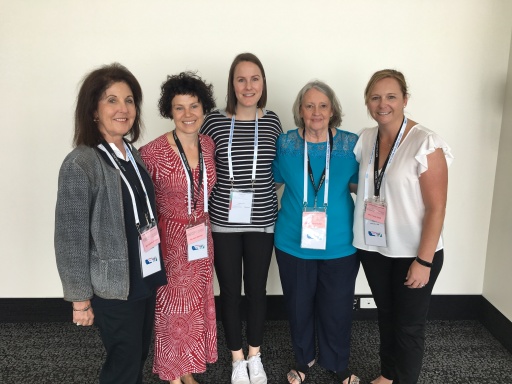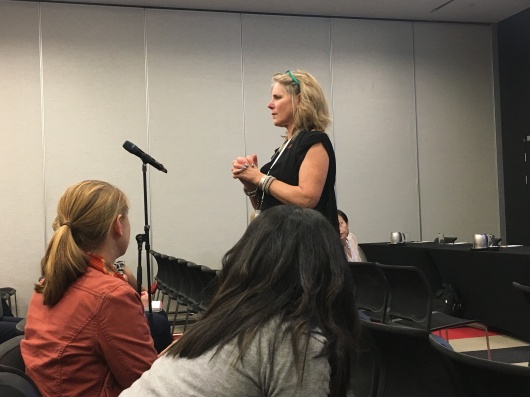November 2016
My genetic make up gave me an increased chance and ultimate diagnosis of breast cancer.
It has also given me a sense of responsibility.
That sense of responsibility led to an application to become a part of the Australia New Zealand Breast Cancer Trials Group (ANZBCTG) IMPACT Advocate Program and an opportunity to spend an incredible week on the Gold Coast hearing from world-leading breast cancer researches, scientists and clinicians.
Along with four amazing fellow survivors from around Australia and New Zealand, I attended the Clinical Oncology Society of Australia (COSA) 43rd Annual Scientific Meeting that was held in conjunction with the ANZBCTG’s 38th Annual Scientific Meeting for the first time since 2010.

The aim of IMPACT is to recognise the important contributions made by women to breast cancer clinical trials research and to offer those who are part of the program the opportunity to learn more about past, present and future research so we can advocate for increased participation in breast cancer clinical trials in the broader community.
The chemotherapy regime I was prescribed was part of a clinical trial. When my oncologist first mentioned it to me all I could hear was “Would you like to be a guinea pig?”
I soon learnt that thoughts could not have been further from the truth and post-conference I am more intrigued than ever about clinical trials and the impact they can have on screening, diagnosis, treatment and survivorship in the not-so-distant future.
That’s the kind of knowledge I see as power and my ‘responsibility’ as a survivor to pass on.
Privileged is an understatement to explain how I felt being selected to be a part of this join conference that offered presenters from around the world.
Those presenters included Australia’s own Dr Shom Goel who trained at the University of Adelaide but now works in the US as a physician-scientist at the Dana-Farber Cancer Institute and Harvard Medical School in Boston as well as Dr Laura Esserman, one of the most engaging and passionate speakers I have ever heard (on any topic). Dr Esserman is recognised as one of America’s leading experts in breast cancer research and treatment and was recently named in the TIME 100 most influential people in America.

They are just two of the names I had never heard of before heading to the conference — and they are now two names I will never forget.
Their impact was felt not only because of the way in which they spoke about cancer research to the clinicians in the room, but the way in which their presentations always had an underlying tone of putting patients at the forefront of any research or treatment.
The pair continued to re-iterate throughout their numerous conference presentations that the thinking in cancer care needs a momentum shift with a cautious “less can be more” approach. Individualised care and sparing patients invasive treatments that they don’t need are areas this amazing pair focussed on when it came to advanced cancer research.
One of the sentences I heard during my treatment that will forever stick with me came from my radiation oncologist. Upon review of my ongoing care (following chemotherapy and mastectomy) the Dr recommended radiotherapy. Upon recommending six weeks daily radiotherapy she said to me, “I really hope that in 10 years time it’s proven that you didn’t need radiotherapy, but at this point in time it should be a part of your treatment if it is going to be as comprehensive as possible.”
I hope she is proven wrong too so less and less patients have to endure the daily rays of radiotherapy and it’s exhausting and physically-scarring side effects. After spending hours upon hours in lecture theatres at the COSA-ANZBCTG Joint Annual Scientific Meeting listening to professors, researchers, physicians, scientists, psychologists, dieticians and surgeons — I am filled with so much hope that their dedication to the cause will start to lead to less “over treatment” in breast cancer patients.
Professor Bruce Mann, a surgical oncologist at the Royal Melbourne and Royal Women’s Hospital left us survivors with even more faith in the work being done in the breast cancer setting. He said, “It is east to get focussed on the research and forget about the patients. But often it’s those patients, whether it be in the clinic or as part of a consumer group, who remind you why you do the research.”

Sounds incredible!
LikeLike